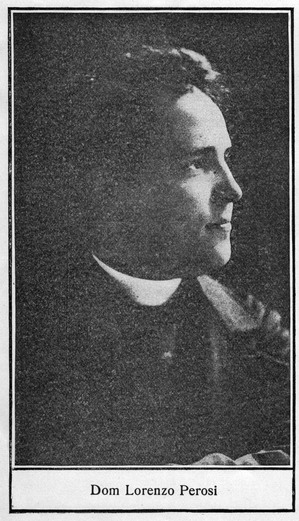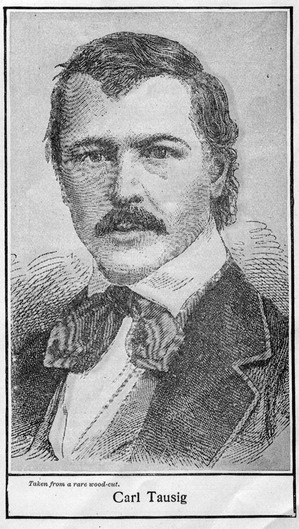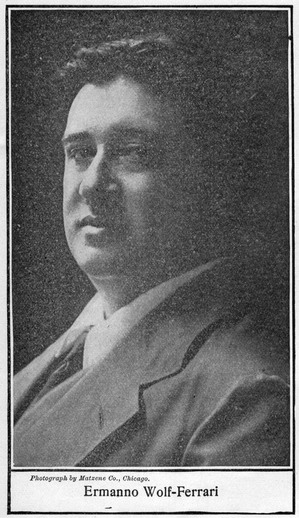 ERMANNO WOLF-FERRARI.
ERMANNO WOLF-FERRARI.
(Vohlf-Fayr-rahr’-re.)
Wolf-Ferrari was born in Venice, January 12, 1876. His father was a German painter, and it was originally intended that the son should adopt his father’s career. Music always claimed his attention, however, though he was self-taught until his nineteenth year. He went to Munich in 1893, and for two years was a pupil of Rheinberger, under whom he made a thorough study of composition. In 1902 Wolf-Ferrari was appointed director of the Liceo Benedetto Marcello in Venice, a post which he retained until 1909, when he resigned in order to live in Germany. Since then he has become very widely celebrated as a composer of operas, and no less than three of his works have been produced in America during the season 1911-12, under his own conductorship. These works, Le Donne Curiose, The Secret of Suzanne and The Jewels of the Madonna, have established Wolf-Ferrari’s reputation as a composer whose remarkable melodic gifts are equaled by his technical equipment—a rare combination. Other works of his which have won attention are the opera Cenerentola and his two oratorios, La Sulamita and La Vita Nuova. Among his less ambitious works are a sinfonia da camera in B flat (for twelve instruments), a violin sonata and a piano quintet.
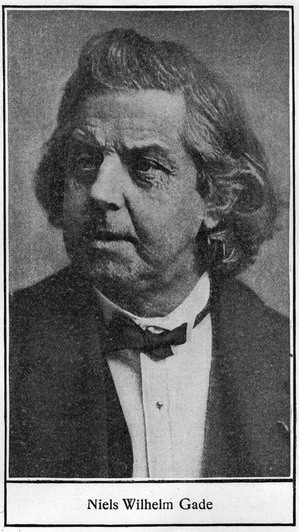 NIELS WILHELM GADE.
NIELS WILHELM GADE.
(Gah’-deh.)
Gade was born February 22, 1817, at Copenhagen, where he died, December 21, 1890. He was the son of a maker of instruments, and after struggling with the guitar, violin and piano with indifferent success, he studied music under Weschall, Berggreen and Weyse. After playing for a time in the royal orchestra at Copenhagen, his Ossian Overture won a prize, and attracted the attention of the King of Denmark. Gade received a pension, which enabled him to travel abroad, and in this way became acquainted with Mendelssohn, who took a great interest in him. After leaving Leipsic, Gade traveled in Italy. He soon returned, however, and during Mendelssohn’s absence conducted the Gewandhaus orchestra. In the winter of 1845-46 he acted as sub-conductor to Mendelssohn at the Gewandhaus, and after Mendelssohn’s death he became the chief conductor. Gade returned to Copenhagen in 1848, to occupy a post as organist, and to direct the Musikverein. In 1861 he was appointed Hof-capellmeister. Gade’s compositions show the influence of Mendelssohn, but are nevertheless strongly imbued with the Northern spirit. He wrote eight symphonies, The Crusaders, the Aguarellen (for piano), besides much orchestral, choral and chamber music, including the beautiful trio in F for violin, ‘cello and piano. His sonatas for violin and piano are exceedingly fine.
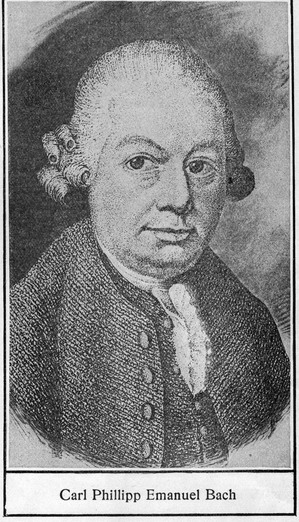 CARL PHILIPP EMANUEL BACH.
CARL PHILIPP EMANUEL BACH.
(Bahch, final ch gutteral.)
Carl Philipp Emanuel, the third son of John Sebastian Bach, was born at Weimar, March 8, 1714, and died at Hamburg, December 14, 1788. His father educated him with a view to studying philosophy at the Thomasschule and at the Universities of Leipsic and Frankfurt on Oder, where he studied law. Musical influences, however, proved stronger, and in 1738 he entered the service of the Crown Prince of Prussia (afterwards Frederick II). He remained there in uninterrupted service until 1767, when he succeeded Telemann at Hamburg. His unusual combination of sound musicianship and scholarly attainments along other lines won him immense popularity, and his genial wit and kindly disposition endeared him to all with whom he came into contact. As a composer he marks the transition between the polyphonic school of Bach and Handel, and the monophonic school of Haydn and Mozart. It is to Emanuel Bach we owe the modern cyclical sonata form, with its combination of different movements closely related in spirit, a form so plastic that Haydn employed it for moods of infinite grace and delicacy, while Beethoven made it the expression of “Fate knocking at the door.” Emanuel Bach did much to advance the pianoforte technic of his day, and wrote a large number of pieces for this instrument, alone as well as in combination with other instruments.
Lorenzo Perosi was born at Tortona, Italy, December 20, 1872. He was the son of the director of music at the cathedral in Tortona, and was early destined for the priesthood. He studied music at Milan concervatory (sic), 1892-93, and then went to Ratisbon to study church music under Haberl. After a short time at Imola he was made choirmaster of St. Mark’s, Venice. In 1898 he was appointed musical director at the Sistine chapel in Rome. There is little doubt that the marked improvement in the music which culminated in the decree of Pope Pius X was largely due to Perosi’s influence. He first attracted general public attention, however, by his trilogy of oratorios, The Transfiguration, The Raising of Lazarus and The Resurrection of Christ, which were given in Italy in 1897-99, with great success, and were given in London in 1899. Two more oratorios followed, Moses (1901) and Leo the Great (1902), and this brings us to the most ambitious of his works, The Last Judgment, which was produced at Rome in 1904. He has written a large number of masses, much organ music, orchestral variations, and other works of various kinds. Rumors are continually arising that he is at work on an opera on the subject of Romeo and Juliet. A new cantata, Anima, and some orchestral pieces, including a tone poem on the subject of Tripoli, are among his most recent works. Perosi is undoubtedly the most important of modern Italian church composers.
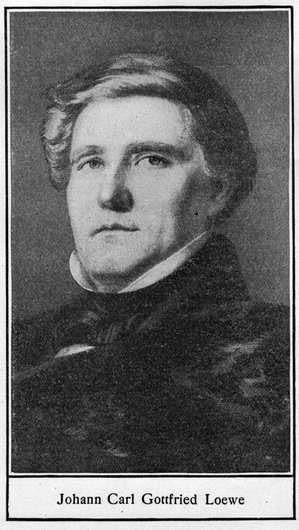 JOHANN CARL GOTTFRIED LOEWE.
JOHANN CARL GOTTFRIED LOEWE.
(Lay’-veh, almost Lur-veh.)
Loewe was born November 30, 1796, at Loebejuen, and died at Kiel, April 20, 1869. He obtained a place in the choir at Cöthen, in 1807, and Turk, the conductor of the town choral society, befriended him greatly. Turk persuaded King Jerome to give Loewe a pension of 300 thalers, and by this means he was enabled to pursue his musical education. The outbreak of the war of 1812 deprived Loewe of his means of livelihood, but through the help of Niemeyer, chancellor of the Cöthen gymnasium, he entered the University of Halle as a theological student. In 1820 Loewe was appointed professor at the gymnasium and seminary of Stettin, and a year later became Musik-direktor to the Municipality, and organist at St. Jacobus. He soon established a distinguished reputation both as professor and as composer. He visited Vienna, London and other important centers, and was a favorite of the German emperors William III and IV. His compositions include five operas, many oratorios, symphonies, concertos and other works. His most important works, however, are his ballad songs, which he often sang himself. These include Edward, Archibald Douglas and The Maid of the Inn, three ballads which find a welcome place in the repertoire of many modern singers.
Tausig was born at Warsaw, November 4, 1841, and died at Leipsic, July 17, 1871. After studying piano with his father he became the most brilliant of the Liszt pupils at Weimar, where his fellow-students included Bülow, Bronsart, Klindworth, Pruckner, Cornelius, Joachim (concertmeister), Raff and a host of brilliant musicians. He made his Berlin début in 1858, and his technical ability caused great excitement, though his lack of restraint occasioned some criticism. After giving concerts in various German cities he went, in 1862, to reside in Vienna. Here he attempted to repeat what Bülow was doing in Berlin—to give orchestral concerts of a very “advanced” type—but without success. For a time he lived in comparative retirement, but in 1865 he married, and settled in Berlin. Opinion as to his genius was now unanimous. Added to his phenomenal skill was the authority and restraint of a scholar and a master. Though he was highly gifted as a composer, he was able to create but little during his short life. His remarkable arrangements of Schubert, J. Strauss and other composers are still often found on the concert programs, and his Daily Exercises are the forerunners of all virtuoso technical studies. The Tausig-Clementi Gradus ad Parnassum is of inestimable value to piano students.


